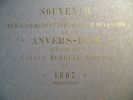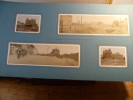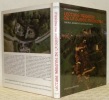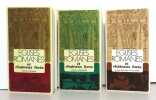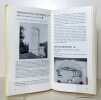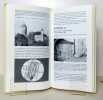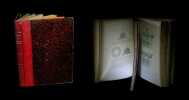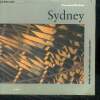-
Type
Any type (2)
Art print (7)
Book (31129)
Disk (1)
Drawings (7)
Engraving (9)
Magazine (130)
Old papers (1)
Photographs (14)
Posters (4)
-
Latest
Last 24h (5)
Last 3 days (10)
Last month (296)
Last week (43)
-
Language
Dutch (1)
English (54)
French (31203)
German (6)
Italian (18)
Japanese (2)
Portuguese (9)
Spanish (11)
-
Century
16th (15)
17th (56)
18th (209)
19th (1569)
20th (9434)
21st (1703)
-
Countries
Belgium (9472)
Brazil (7)
Canada (108)
China (3)
Côte d'Ivoire (63)
Denmark (215)
France (18347)
Germany (1)
Greece (1)
Italy (36)
Switzerland (3051)
-
Syndicate
ALAC (99)
CLAM (42)
CLAQ (94)
CNE (3)
ILAB (10806)
NVVA (1161)
SLACES (1161)
SLAM (8281)
SNCAO (9)
Toscane Romane. ‘La nuit des temps‘, 57.
Yonne, Zodiaque, 1982, gr. in-8vo, 361 p., ill. de très nombreuses photos en héliogravure, reliure en toile originale avec jaquette ill.

(SLACES, NVVA)
Phone number : 41 (0)26 3223808
L'architecture funéraire monumentale : La Gaule dans l'Empire Romain. Actes du Colloque organisé par l'IRAA du CNRS et le Musée archéologique Herni-Prades, Lattes, 11-13 octobre 2001.
2006 Paris, Edition du Comité des Travaux Historiques, 2006, in 4° broché, 522 pages ; très nombreuses illustrations et figures ; couverture illustrée.
...................... Photos sur demande ..........................


Phone number : 04 77 32 63 69
L'Architettura Romanica Religiosa nel Territorio dell'Antica Repubblica Senese
Edizioni Benedettine, Parma 1962 Livre en italien. In-4 broché 28 cm sur 19,5. 350 pages. Pas de jaquette. Bon état d’occasion.
Descrizioni di edifici religiosi di architettura romanica nel senese. Descrizioni, piantine, bibliografie, fotografie in bianco e nero. Descriptions d’édifices religieux en style romanique dans le territoire de Siène. Descriptions, cartes, bibliographies et photographies en noir et blanc. Bon état d’occasion
Que sais-je? N° 18 Histoire de l'architecture
Presses Universitaires de France edition Original Première édition 30 Décembre 1941. 1941. In-12. Broché. Bon état, Couv. convenable, Dos satisfaisant, Intérieur frais. 128 pages illustrées de quelques dessins en noir et blanc. . . . Classification Dewey : 720-Architecture
La première encyclopédie de poche fondée en 1941 par Paul Angoulvent, traduite en 43 langues, diffusée, pour les éditions françaises, à plus de 160 millions d'exemplaires, la collection Que sais-je? est l'une des plus importantes bases de données internationnales, construite pour le grand public par des spécialistes. 3800 titres ont été publiés depuis l'origine par 2500 auteurs. Classification Dewey : 720-Architecture
Gold-Glass Collection of the Vatican Library; with additional catalogues of other gold-glass. Edited by Guy Ferrari
Rome, Citta Del Vaticano, 1959 Bound in half brown cloth with paper woodgrain boards. folio 42 x 27 cm. 79 pages of text describing 460 items that are photographically illustrated in 36 pages with 460 plates. ENG. very fine condition!
The Gold-Glass Collection of the Vatican Library; with additional catalogues of other gold-glass. Edited by Guy Ferrari
Souvenir du Rehaussement et déplacement de la Gare de Anvers-Dam exécuté par Albert Morgalia Ingénieur. Anvers, 1907.
Grand album in-folio 132 photos originales en noir et blanc, montées.Reliure originale en plein maroquin marron, plats avec un double filet doré en encadrement avec un couron d'or dans les coins, dos à nerfs, gardes de moirée blanc, roulette intérieur dorée, tranches dorées (C. Delogie).En 1907, la gare dut être déplacée de 36 mètres vers le sud-ouest pour faire place au rehaussement et à l'élargissement du périphérique est. C'était moins cher que la démolition et la construction neuve. A cette époque une opération remarquable et unique. Le déplacement s'est effectué à l'aide de coffrages et de vérins mécaniques avec lesquels le bâtiment a été surélevé de 1,60 mètre et transporté. L'ensemble du processus a duré 3 semaines et est illustré en détail dans cet album avec des photos avant, pendant et après l'opération. Avec des portraits de l'ingénieur Albert Morglia, du Prince Albert et de la Reine Margherita de Savoie. Quelques photos de la visite du Prince Albert lors des travaux.Groot album in-folio. met 132 orig. zwart-witfoto's, gemonteerd.Orig. band in vol bruin marokijn, dubbele vergulde filet als omkadering op de platten, met verguld kroontje in de hoeken, rug met ribben, contreplat en schutbladen met witte moiré, vergulde roulette, sneden verguld (C. Delogie). Dit exemplaar werd mogelijk aan de toenmalige Koniging van Italië geschonken die net als Prins Albert de werken is komen aanschouwen. Vandaar waarschijnlijk ook de vergulde kroontjes in de hoeken van de band.In 1907 moest het station 36 meter naar het zuidwesten worden verplaatst om plaats te maken voor de verhoging en verbreding van de oostelijke ringweg. Dit was goedkoper dan sloop en nieuwbouw. In die tijd een opmerkelijke en unieke operatie. De verhuizing vond plaats met behulp van vals werk en mechanische vijzels waarmee het gebouw 1,60 meter werd opgetild en vervoerd. Het hele proces duurde 3 weken en wordt in dit album uitgebreid geïllustreerd met foto's voor, tijdens en na de operatie. Met portretten van de ingenieur Albert Morglia, prins Albert en koningin Margherita van Savoye. Enkele foto's van het bezoek van Prins Albert tijdens de procedure.Large in-folio album with 132 original black & white photographs.Orig. full brown leather binding, guilt decorations, raised spine.This album was probably a gift to the former Queen of Italy who visited the construction works, as did Prince Albert. In 1907 the station had to be moved 36 metres southwest to make way for the raising and widening of the eastern ring road. This was cheaper than demolition and new construction. In that time a remarkable and unique operation. The relocation took place using falsework and mechanical jacks with which the building was raised 1,60 metres and transported. The whole process took 3 weeks and is illustrated in detail in this album with photos before, during and after the operation. With portraits of the engineer Albert Morglia, Prince Albert and Queen Margherita of Savoy. Some photos of the visit of Prince Albert during the proceedings.
Les Dernières années de l'ancienne cathédrale Saint-Vincent de Mâcon (1790-1799).
Mâcon, (1936) in-8, paginé 245 à 272, 1 planche, 2 plans et 2 ill. in-t., broché sous couv. papier marbré moderne
Extrait des Annales de l'Académie de Mâcon, 1935, tome XXX. - - VENTE PAR CORRESPONDANCE UNIQUEMENT - LIEN DE PAIEMENT, NOUS CONSULTER.
Eglises romanes et chateaux forts - suisse romande
Bonvent in8. Sans date. Cartonné.
intérieur propre bonne tenue
Lecture aérienne de la Suisse médiévale. Bourgs, églises et châteaux forts. avec une préface de Alfred A. Schmid. Flus ins Mittelalter. Burgen, Kirchen, Städte als Zeugen mittelalterlicher Kultur in der Schweiz. Mit einem Vorwort von Alfred A. Schmid.
Lausanne - Bern und Stuttgart, Editions Payot - Hallwag Verlag 1976, 285x235mm, 127pages, reliure d'éditeur sous jaquette. Bel exemplaire.
photos couleurs et n/b in et hors texte, Pour un paiement via PayPal, veuillez nous en faire la demande et nous vous enverrons une facture PayPal
Églises romanes et châteaux forts. I: Suisse romande - II: Suisse alémanique - III: Suisse rhétique et italienne IXe-XIIIe siècle.
Lausanne, Payot, 1972-1974-1977. 3 volumes in-8, cartonnages illustrés, légèrement défraîchis. Photographies et plans in-texte en noir.
Carte d'hommage de l'auteur, signée, le second volume comporte un long envoi autographe signé de Morgan Stuart.
Églises romanes et châteaux forts. I: Suisse romande - II: Suisse alémanique - III: Suisse rhétique et italienne IXe-XIIIe siècle.
Lausanne, Payot, 1972 à 1977. Complet en 3 volumes in-8, cartonnages illustrés. Photographies et plans in-texte en noir. Dos très légèrement insolés.
Das Ende vom Lied. Lyrisches Testament eines Schindsüchtigen.
Bern, Kunstgesellschaft, 1930 Kl.-4°. (4) Bl., (36) S. (3) Bl. Mit 4 Lithographien von Ernst Morgenthaler. Orig.-Halbpergamentband in Schuber.
Eins von 40 Ex. der Vorzugsausgabe auf Zerkallbütten vom Künstler im Druckvermerk signiert.
Raccolta di un amatore d arte primitiva
Bern, Kunstmuseum Bern, 1980 Black linnen binding with dustjacket, 474 pages, 30.5 x 22 cm, black/white illustrations, Italian.
Raccolta di un amatore d arte primitiva
Projet de palais. Planche extraite de la publication mensuelle Croquis d'architecture, Intime-club.
- Planche autographiée. 35 x 55 cm.
Vieux papier. Croquis d'architecture, Août 1866.
Etudes sur l'Architecture : Dessins - Formes - Compositions.
Paris, Veuve A. Morel et Cie, 1883. Un fort vol. in-4 (332 x 228 mm) de 1 f. bl., 4 ff. n.fol., 1 frontispice gravé n.fol., 206 pp., 46 planches gravées, viii pp., 1 f. n.fol. et 1 f. bl. Reliure de l'époque de demi-chagrin cerise, filet vertical à froid ornant les plats, dos à nerfs ornés de filets gras et maigres à froid, titre doré, tête dorée.
Edition originale rare de cette importante étude. Elle s'agrémente de 46 planches gravées. ''Je me propose ici de donner les meilleurs moyens pour mettre en forme les idées contenues dans le présent ouvrage, dépurer, autant que possible, les formes et de montrer quelques aperçus nouveaux sur l'art et la manière de composer. Quant aux exemples donnés, ils donnent à voir des ajustements qui n'ont pas encore été exécutés, pour qu'on puisse s'en inspirer, en tâchant de s'affranchir des prétendus principes dits classiques, et en n'admettant pour guides l'étude approfondie de l'antiquité''. Coiffes élimées. Petite coupe (sans manque) en tête du dos. Manque de papier marbré affectant le dernier plat. Marge des feuillets légèrement jaunie. Du reste, bonne condition.
MORIN SAUVADE Hélène / FLEISHHAUER Carsten / SAUVAGEOT Claude (photographies)
Reference : 116655
(2002)
Sénanque.
Zodiaque Voie Lactée 2002 Zodiaque, Coll. Voie Lactée, 2002, 219 p., cartonnage éditeur sous jaquette. Bon état.
Merci de nous contacter à l'avance si vous souhaitez consulter une référence au sein de notre librairie.
Tableaux détaillés des prix de tous les ouvrages de batiment, selon leurs genres différens ; suivis d'un traité sur la manière de les toiser ou mesurer (Volume 4)
A Paris, chez Carilian-Goeury, libraire, quai des Augustins, n°41, A Paris, chez Mme veuve Morisot, rue de l'Echiquier, n°38 Relié 1824 "In-8 (14 x 21,6 cm), reliure demi-peau, dos lisse orné de filets et fers dorés, 522 pages, ""Tableaux détaillés des prix de tous les ouvrages de batiment, selon leurs genres différens ; suivis d'un traité sur la manière de les toiser ou mesurer ; à l'usage des architectes, ingénieurs, vérificateurs, toiseurs et entrepreneurs de batimens ; des propriétaires de maisons, et de tous ceux qui veulent faire batir, IVe volume : Marbrerie, pavage, poêlerie, plomberie, fontainerie, papiers de tenture, miroiterie, tapisserie, treillage, grillage, vidange, terrasse"" ; coins frottés, quelques petites marques d'usage sur le dos, bon état général. Livraison a domicile (La Poste) ou en Mondial Relay sur simple demande."
La mémoire du paysage. Histoire de la forme urbaine d’un centre ville: Saint-Roch, Québec.
Québec, Les Presses de l’Université de Laval 2001, 240x165mm, 286pages, broché. Très bel exemplaire.
illustré, Pour un paiement via PayPal, veuillez nous en faire la demande et nous vous enverrons une facture PayPal
Das Antike Theater und die modernen Reformbestrebungen im Theaterbau
Karlsruhe, 1910 114pp., with 68 bl/w illustrations, 29cm., text in German, Doctoral Dissertation (Von der Grossherzogl. Technischen Hcchschule zu Karlsruhe zur Erlangung der Würde eines Doktor-Ingenieurs genehmigte Dissertation), stamp at verso of title page, softcover, text is clean and bright, S109526
Manuel des toits plats
Dunod, 1967, pet. in-4 rel. toile (16 x 25), XXII-516 p. - XXVI, traduit de l'allemand par J. Schmitt (2ème édition de Berlin 1964 revue et augmentée parue sous le titre : "Flachdachhandbuch"), 434 fig. in-t., bon état.
Le présent manuel a pour but de combler une lacune car il n'existait pas à ce jour une prescription D..I.N. sur l'exécution des toits plats selon les règles du calorifugeage, des contraintes thermiques, de la diffusion de la vapeur, etc. Voir le sommaire sur photos jointes.
Masterpieces of Flanders Golden Age
, Yomiuri Shimbun , 2001, 2001 Softcover, 201 pages, ENG / JAP, as good as new, 305 x 23 mm, with illustrations in colour and b/w, . ISBN X.
Isetan Museum of Art [Tokyo] Iwaki City Art Museum [Fukushima] Museum of Modern Art [Ibaraki] Museum of Modern Art [Shiga] Miyazaki Prefectural Art Museum
MAISONS DE VILLE
SEUIL. 2009. In-4. Relié. Bon état, Couv. convenable, Dos satisfaisant, Intérieur frais. 240 pages - Nombreuse photos en couleur dans et hors textes - Nombreux plans en Noir et Blanc - Jacquette correcte. Avec Jaquette. . . Classification Dewey : 720-Architecture
Classification Dewey : 720-Architecture
Ausdrucksvoller Kopf eines Mädchens.
Holzschnitzerei. Höhe der Skulptur: 34 cm, Breite: 19 cm, Tiefe 19 cm.
Mit leichten Gebrauchsspuren.
HISTORY OF URBAN FORM. Before the Industrial Revolutions.
Longman; 1997 ; 3rd ed, in-4 softcover, illustrations. 444 pp, . In english. Cover in good condition, inside very good.
Sydney - guide de l'architecture contemporaine
Ellipsis konemann. 1997. In-24. Broché. Etat d'usage, Couv. légèrement pliée, Dos satisfaisant, Intérieur frais. 316 pages. Nombreuses photographies en noir et blanc, hors texte. Pliure sur le 1er plat.. . . . Classification Dewey : 720-Architecture
Classification Dewey : 720-Architecture
 Write to the booksellers
Write to the booksellers